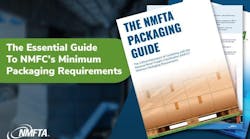As part of a recent marketing survey, our company asked, “What's the first word that comes to mind when you think of the trucking industry?” Of 122 responses, 70 people, or 57%, responded with a word that can be interpreted as negative, like “dirty,” “loud” or “unprofessional.”
Anyone who makes a living in this business knows the public has a negative perception of the industry. The trouble is, it's costing us a ton of money.
How? Recruiting is one example. Few university grads consider trucking as a career option, and not many people change careers to join the workforce of a freight carrier. A poor image leads to regulations that erode our bottom line. Why? Because people — voters — squawk to their politicians about those “dirty, noisy, unprofessional truckers.”
I've met many smart, passionate and considerate people during my 20-plus years in trucking, yet this reputation persists. As an industry, I don't know how we shake it; but as individual carriers, and marketing pros, we can reflect on how to polish our own image:
- Slow down
There's a lot of hyperbole on all sides of the truck-speed debate, but as a sales and marketing manager, make sure your voice is heard. First, speed adds costs that affect margins. Second, people are afraid of big trucks, especially trucks barreling down the highway at 75 mph. Third, capping speed shows customers that you're serious about your fuel costs — and acting responsibly with your surcharges.
- Don't devalue your service
Cut-rate pricing turns trucking into a commodity and it hurts us all. Deal-of-the-day specials typically include late deliveries, rushed drivers, lack of available equipment, and lots of nonsense — none of the things I want to be associated with. They're a stain on the industry's overall reputation.
- Know your politicians
You provide jobs, tax revenues and keep the commerce flowing in their districts. If you have ideas about transportation issues, infrastructure projects, taxes and so on, don't let them die at the office water cooler. Take them to your representatives.
- Lend your good name
We sponsor more Little League teams and charity golf tournaments than I can count. What's in it for us? Good corporate citizenship. People in my community feel better about my company and we have little trouble filling jobs with qualified candidates who live in the area. We've even pulled in new customers.
- Stay clean
At first glance, cutting back on truck washes is an easy money-saver. But a clean truck driven by a professional driver sends a strong, positive message to your customers, your bankers, your mother-in-law — anyone who sees it. You wouldn't wear a pair of ripped jeans and a dirty shirt to a client meeting. Don't let your most visible marketing tool leave the yard looking shabby.
- Promote pride
You can join the local traffic club or trucking association for less than the cost of a Yellow Pages ad. Encourage your employees to get involved and lend their voices to the industry.
If your employees are proud of what they do, they'll feel better about the company they work for and the industry as a whole. They're far more likely to stand tall when they tell people who they work for and what they do for a living. It's the best first step on the road toward improving trucking's image.
Mike McCarron is managing partner at the MSM Group of Companies, which specializes in transportation and logistics service between Canada and the United States.


